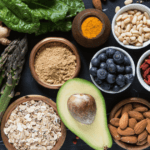Are you considering adding protein shakes to your diet? If you are looking for a convenient way to get more nutrients, drinking protein shakes can help. But when is the best time to drink a protein shake?
Protein plays an essential role in nutrition, as it helps with recovery after intense physical activity or strenuous exercise. Protein also helps boost the immune system and keeps bones and muscles strong. Protein supplements come in a variety of forms such as a pill, powder, or liquid. Protein drinks offer an alternative for those who don’t have time to cook healthy meals or don’t like taking pills.
However, is timing important when it comes to consuming protein supplements? In this article, we will cover the importance of protein, how you can supplement your protein with shakes, and when is the best time to drink them.
This post contains affiliate links and I earn a small commission when you purchase through these links at no additional cost to you.
What is protein and why is it important?
Protein is made from basic building blocks called amino acids. You have at least 10,000 different proteins in your body, including in your muscles, skin, bone, hair, and essentially every other part.
Protein is required for the structure and function of your body’s tissues and organs, so it’s important that you consume the recommended daily amount. Fortunately, most healthy adults in the US are getting enough protein from sources like meat, eggs, dairy, and beans. Protein deficiency can lead to delayed growth, loss of muscle mass, a weakened immune system, and, in severe cases, death. These are issues faced by many in countries with food insecurity.
When is the best time to drink a protein shake?
People supplement their diets with protein shakes to help them achieve several different fitness goals. Because these goals are so different, how — and more specifically, when — people should drink their protein shakes can vary.
To determine the best time for you to drink your protein shake, you first need to consider your overall goals: Is your focus on muscle building? Are you looking to lose weight? Once you pinpoint what it is that you want to achieve, you can use the information below to figure out when you should drink your protein shake. Your goals will also play a part in determining what type of protein you’ll want to consume.
Is it better to drink a protein shake before a workout or post-workout?
There are differing points of view on whether to drink a protein shake pre- or post-workout. Some believe consuming protein before a workout gives you the strength to power through it. Others say drinking your shake after a workout is key for building muscle.
Studies have shown that the effects of consuming protein before or after a workout were the same when it came to increasing muscle mass and boosting strength. It’s more important that you meet your overall daily protein recommendations than when you meet them.
However, if you’re planning to do a high-intensity or endurance workout, eating protein and carbs 30 to 45 minutes before and after is wise. If your workout is less strenuous, like walking or slow-paced yoga, then you don’t necessarily need the extra protein from a shake so long as you’re eating protein in your three daily meals.
How many grams of protein a day are recommended?
According to the Mayo Clinic, an average, sedentary adult should consume 0.8 grams of protein per kilogram of body weight. For example, a person weighing 150 pounds, or 68 kilograms, should aim for 54 grams of protein each day.
However, as you age, you start to lose muscle mass and your daily protein requirements increase to 1-1.2 grams per kilogram of body weight. Using the example above, this would increase the daily recommendation from 54 grams to 68-82 grams. Again, this is for an average, sedentary adult.
If you exercise regularly, your protein needs increase to between 1.2-1.7 grams per kilogram of body weight. If you exercise moderately, stick closer to the 1.2 recommendation. However, if you lift weights or are training for an endurance event, you’ll want to be closer to the high end of 1.7. Consuming more than 2 grams of protein per kilogram of body weight is considered excessive. Your body can’t store excess protein. Once your body’s protein needs are met, any extra is used for energy or stored as fat.
If you are overweight, you may need to adjust the ratios above. It’s best to consult with a dietician to determine what’s best for you considering any weight loss goals and your level of physical activity.
What are the sources of protein?
The healthiest forms of protein are from plants. These include nuts, beans, and legumes. Pea protein is commonly found in plant-based protein shakes. My favorite is chocolate Juice Plus+ Complete. I also like Orgain Organic Plant-Based Protein Powder in creamy chocolate fudge. You can get 35% off a subscription using the link below.
Other forms of protein are animal-based. These include beef, pork, chicken, eggs, and dairy. The most common animal-based protein in shakes is whey, a main protein found in milk. A couple of options are this Thrive Market Organic Whey Protein or this Optimum Nutrition Gold Standard 100% Whey Protein. If you are sensitive to dairy, you may want to opt for a plant-based protein shake. Whey can cause acne in some people.
Should you supplement your protein intake with shakes?
While it’s not necessary to supplement your protein with shakes, you may choose to for various reasons. First, if you’re not meeting your daily protein requirements with food alone, supplementing with shakes is a great option. Also, you may find it easier to consume protein with shakes rather than cooking. Shakes are not only easy to make, but they’re also convenient to consume as there are no knives and forks involved.
Protein shakes should not be used as a complete substitute for traditional sources of protein like meat, eggs, legumes, and nuts.
How are the various protein shakes different from one another?
We already talked about plant-based and animal-based sources of protein found in shakes, but how are they handled differently by our bodies? Whey protein is digested more quickly, making it a good post-workout drink. Soy and casein, another protein derived from milk, are digested more slowly and can help you feel fuller for longer.
If your goal with protein shakes is weight loss, it’s best to choose one that is low in carbs and sugar. A good option is this Orgain Keto Collagen Protein Powder in chocolate.
If you’re looking to build muscle mass, choose a higher-calorie powder and opt for whey protein, like this Thrive Market Organic Whey Protein.
How you choose to get your daily recommended amount of protein, and what types you consume, is a very personalized decision. Protein shakes are a great way to supplement your daily intake in an inexpensive, convenient, and delicious way. Whether your goal is losing weight, building muscle mass, or simply meeting your daily protein needs, there is a shake that is right for you if you’d like to supplement.




